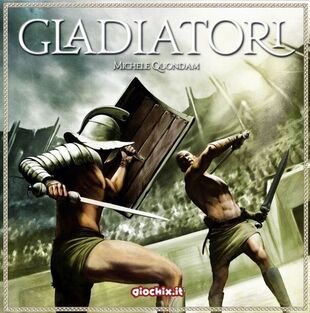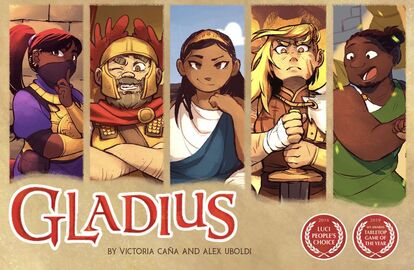 Click here for the previous post in this series. We're getting to the games now. There are actually several approaches to cover, but I want to confront what feels like the simplest one first: erasure. If you want to have all the fun of a gladiator game and none of the guilt, it is a lot easier to pretend that whole slavery thing was no big deal, or even that it never happened at all. Modern board games do not typically dwell on the fact that gladiators were either slaves or people who had volunteered to accept a low social status. In fact, it is so easy to forget that we as gamers routinely erase that reality entirely from our play, even when enjoying gladiator games that are explicitly set in ancient Rome. A game from 2012 entitled Gladiatori includes flavor text that deemphasizes the reality of slaves as the foundation of gladiatorial combat and plays up the excitement of potential fame and glory: During the Roman Empire, gladiator combat was the most popular form of entertainment. Fighters from all parts of the Empire were included in the shows, including female gladiators, wealthy Roman citizens and in some cases, even aristocrats. Now the time has come for you to gain the immortal glory of the Arena. Fight for your honor, for fame, and for your life! (1) From this description, a player might never realize that most gladiators were slaves. Honor, fame, and excitement win the day. In fact, based on the description from Gladiatori, you might see gladiator fights as focused entirely on shocking exploits by the wealthy, and sometimes women (there in fact were female gladiators, and they caused quite a scandal). The recent game Gladiatores: Blood for Roses (2020) places you in the role of a lanista, or someone who controls a gladiator school and would have bought and sold gladiators in the regular course of business. The game, however, makes that business more palatable by adjusting its language: “To [win], each player bids for the most famous gladiators in history. Hiring these professional fighters for upcoming events will increase your school’s glory and fame and attract bigger crowds to the arena" (2). Players are warned not to spend too much money on “hiring” famous gladiators—explicitly described as “professional fighters”—who don’t earn enough glory for the school in return. By describing what would have been either the purchase of slaves or of contracts in which volunteers gave up their rights as “hiring,” Blood for Roses completely erases the social underpinnings of the gladiatorial combat it celebrates. Aside from this change, however, the trappings of the game are Roman, from the artistic renderings of the gladiators to the Latin words and names sprinkled throughout. This is a game that is very clearly set in Rome, not in a fantasy world— which means the practice of “hiring” gladiators is an erasure of history, not an adaptation of gladiatorial combat to a fictional setting. What makes both of these cases interesting is that they mix in Roman imagery and even actual facts, but they don't include all of the facts. We want the aspects of ancient Rome that we like. But can we really just ignore the ones we don't?  Perhaps the most interesting occurrence of elision of the reality of gladiatorial life takes place in the newly-released game Gladius (2021), in which players are not gladiators or lanistae, but rather spectators who are betting on fights between teams of gladiators—and shamelessly manipulating the outcomes. The game has received praise for its diverse depictions of characters, and there is strong representation of women and people of color among both playable characters and gladiators. The Kickstarter page features a quote from Dr. Seth McCormick, an art history professor, that underscores this point by attempting to ground it in ancient history rather than our modern sensibilities: Thank you for providing further evidence of how diversifying representation in games can broaden players’ perspectives on history. I find that the majority of board games set in ancient Rome adopt a very limited perspective by focusing on war or politics (or both), reinforcing the traditional view that history is the story of Great Men (i.e., rulers and generals). It occurs to me that [Gladius], by emphasizing the importance of spectacle in ancient Roman society (the players are not the gladiators in the arena, but the spectators placing bets), shifts attention to the agency of the masses as the people whose consent actually mattered the most in securing the stability and longevity of the Roman Empire (3). In many ways, McCormick is correct—the Roman world was diverse, and yet is too often depicted as white and male. There are also plenty of interesting aspects of ancient Roman society to study aside from war and politics. But his comments about spectator agency and consent, while well-intentioned, become disturbing when one considers that if Gladius is to be taken seriously as a game about ancient Rome, then the spectators are exercising their agency and consent by placing bets on the bodies of people whose agency and consent were at best limited and at worst completely nonexistent. I haven't spoken with them, but I am 99.99% sure that the designers of the game did not intend for their work to be interpreted this way. But it is the historical reality lurking behind any game with an ancient Roman theme. Many gladiator games on the current market seek to allow us, as modern players, to enjoy the blood, conflict, and spectacle of gladiator games without the guilt. By presenting gladiatorial contests as risks taken by professional fighters, or by implying that they are shows put on by willing combatants of higher social status, or even by focusing on inclusivity among game characters in a way that reflects our modern ideals, we grant intention and agency to our fictional fighters that most real-life ones did not have. By conveniently downplaying the reality that most gladiators were slaves, we make it more palatable to deploy them in the arena, to bet on them, and to take vicious pleasure in their victories and defeats. Is ignoring the historical status of gladiators necessarily a bad thing on board game night? I think that's a matter of what a particular game is trying to say. If you are playing a gladiator game set in a fantasy world, I don't think this historical reality matters all that much—that's why I won't be covering Hoplomachus in this series of posts. I do think that if a game is making factual claims about Rome and about gladiators—and especially if that game prints a blurb from a professor making historical commentary—then questions of accuracy demand serious consideration. Click here for the next post. References: (1) Gladiatori, BoardGameGeek, https://boardgamegeek.com/boardgame/118567/gladiatori (Accessed May 24, 2021). (2) Gladiatores: Blood for Roses Rulebook, p. 1, https://boardgamegeek.com/filepage/192072/gladiatores-rulebook-1st-edition-final-pf (Accessed May 24, 2021). (3) Gladius Kickstarter page (Accessed May 24, 2021).
1 Comment
David
6/4/2021 03:08:03 am
I just wanted to say I'm finding this series of posts really fascinating (and brilliantly written by the way). Even though I have designed a game in the past featuring gladiator fights, I have probably not considered sufficiently all these issues. Gladiators are often romanticised, and it is easy to gloss over the negative aspects because of this - but when it all boils down it is quite a horrific scenario really.
Reply
Your comment will be posted after it is approved.
Leave a Reply. |
AuthorMy name is Liz Davidson, and I play solo board games. A lot of solo board games... Archives
August 2021
Categories
All
|
 RSS Feed
RSS Feed